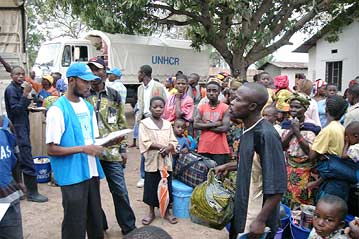Organized returns to South Kivu province in DRC reach 20,000 mark
Organized returns to South Kivu province in DRC reach 20,000 mark

BARAKA, Democratic Republic of the Congo, September 27 (UNHCR) - Just under a year after the UN refugee agency launched a voluntary repatriation programme for the Democratic Republic of the Congo (DRC), more than 20,000 people have returned to the country's South Kivu province with UNHCR help.
The 20,000-mark was passed on September 21, when a boat docked at this port after crossing Lake Tanganyika from Tanzania with hundreds of refugees. "I'm happy to be home," said 49-year-old Ramazani Tambwera, one of the passengers on board the UNHCR-chartered vessel.
But Tambwera, who fled from his home village of Mesisi in 1996, knew that it would not be easy rebuilding his life. "It will be very hard for me. I've lost a lot - my home, my wife, my good health. But at least I'm home, so I'm happy." His wife and seven children died while fleeing to Tanzania.
On arrival here, each returnee receives a standard assistance kit from UNHCR and its partners. This includes household items, plastic sheeting, buckets, jerry cans, mosquito nets, agricultural tools and food rations for three months.
Despite the assistance package, returnees such as Ramazani Tambwera often require additional help to rebuild their lives. "My eldest brother is here, but he is getting old and cannot help me," said Tambwera. "My other surviving family member, my older sister, is a widow and has trouble making her own living. She cannot help me either."
People who stayed in DRC and survived the fighting by fleeing to the bush also face a hard time. Many of these internally displaced Congolese came home to destroyed houses and burned crops, often finding relatives killed, maimed or tortured. Unlike the returnees, they cannot count on a helping hand to get them started - and this can cause friction.
"Individual support from UNHCR to returnees can create problems in the area," warned community chief Kabemba Wakilongo. "These returnees are welcomed as brothers and sisters. However, they are often seen by the families which remained here as additional mouths to feed. Furthermore, because they receive support from UNHCR, they are also often viewed as favoured," he said. "Something must be done to create a balance between the internally displaced, the community and the returning refugees," Wakilongo added.
In order to strike this balance UNHCR combines its repatriation efforts with a community-based approach. The refugee agency is working with non-governmental organisations (NGOs) to try and rebuild bridges within torn communities. Activities range from infrastructure repairs, reconstruction and improvement of education facilities to income-generating activities for women.
"Through operational partnerships and a community-based approach to repatriation efforts we are hoping to achieve a more sustainable and effective level of reintegration and community support," said Eusebe Hounsokou, UNHCR representative in the DRC.
Despite these efforts, UNHCR's effectiveness is limited due to inadequate funding. "Last year we paid all the school fees and gave school kits to each returning child through the NGO AIDES," said Awada Houssein Adar, UNHCR community services officer in Baraka. "Unfortunately, this year we will not have the funds to continue such support. For the next school year we'll have to rely on parent-teacher associations to come to some compromise and mutual agreement on how to pay teachers and enable students to continue their studies."
Additional support from other organisations is expected, but everybody is facing logistical problems due to the poor condition of the existing road network. ACTED, a French development agency, is reconstructing the roads from Baraka to Misisi. "Until the roads are fit for large lorries, the NGOs tell us there can be no support either for returnees or the communities." said Wamalungu Belekelo, chief of the Ngandja area.
Despite these difficulties, UNHCR continues its repatriation activities. Every week the office in Baraka receives and escorts at least two convoys - about 1,000 registered returnees. In addition, many people return on their own.
In early September, UNHCR resumed the organised voluntary repatriation of Congolese refugees following a month-long suspension of activities during the first round of the landmark DRC presidential election. The second round is due to be held on October 29.
More than 70,000 Congolese refugees have returned to DRC since UNHCR launched its organised repatriation programme in October last year. There are still more than 420,000 Congolese refugees in neighbouring countries, including 140,000 in Tanzania.
By Amber Phalen in Baraka, Democratic Republic of the Congo







